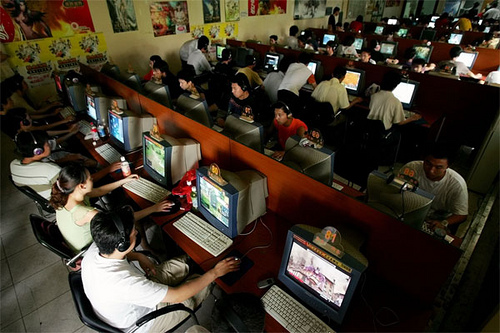The folks at GE put together this neat-o interactive feature that shows you how much carbon is created by your every daily move.
It will either depress you, or make you more of a conscientious carbon consumer. Probably both.
The folks at GE put together this neat-o interactive feature that shows you how much carbon is created by your every daily move.
It will either depress you, or make you more of a conscientious carbon consumer. Probably both.

(photo credit: Tim Yang)
It turns out the Internet is about way more than pictures of cats and x-rated websites.
Internet freedom should not be taken for granted:
“We use the Internet and mobile technology to build society, and we take it for granted that the open Internet will always be in place.” – Brett Solomon, Executive Director of Access
Could the massive political upheavals in the Middle East have happened without the Internet? What can you do to support something like Internet freedom?
Do you know what *your* cause is yet? Take the Your Causes quiz to find out!
We found Peter Thomas hanging around at the Global Student Entrepreneur Awards while we were at the New York Stock Exchange this October.
Peter is a really wise and motivational guy. Here he talks about how following your gut (or your passion) is key to living a happy, successful, and prosperous life.
(You can watch the whole GSEA recap video here. To see all of SPEND.GROW.GIVE’s GSEA interviews, click here.)
“It’s time for us to stop lying to ourselves about this country.
America is great in many ways, but on a whole host of measures — some of which are shown in the accompanying chart — we have become the laggards of the industrialized world. Not only are we not No. 1 — “U.S.A.! U.S.A.!” — we are among the worst of the worst.” (from the original opinion piece)
Are we as bad as the chart says? Where do you see room for improvement?
How can you, as a philanthropist, help the U.S. improve its standing?
Ever hear of a little app called Instagram? How about a website called Hunch? Well apparently they were both created by real people, and in this video those real people are in the same room.
Chris Dixon talks about the long, weird journey from college to Instagram fame, and the terrible moments after the app launched for the first time. He’s interviewed by Kevin Systrom, the creator of Hunch and current darling of the tech start-up world.
“Recently I saw a small business shut its doors. I feel terrible because I am partly to blame.
I never stopped by this store. While I can tell myself it was more convenient to shop at a large retailer, the truth is I didn’t stop in because I never saw any cars in the parking lot. I was uncomfortable with how both of us would feel if I browsed and didn’t make a purchase: He disappointed, me guilty.”
Have you ever avoided going into a store or restaurant because you felt awkward about interacting with the owner or salesperson?
“The recession that just rocked the U.S. economy happened in part because Americans were borrowing and spending more than they could afford. Now, three years after the downturn began, families are moving faster than many analysts had expected to put their finances in order by paying down debt and boosting their savings.”
Are you saving more? Spending less? Do you think saving is good for the economy?
“The World Bank says food prices are at “dangerous levels” and have pushed 44 million more people into poverty since last June.
According to the latest edition of its Food Price Watch, prices rose by 15% in the four months between October 2010 and January this year.
Food price inflation is felt disproportionately by the poor, who spend over half their income on food.”
As a philanthropist, how would you approach the problem of unaffordable food?
“CARACAS, Venezuela — A judge in a tiny courtroom in the Ecuadorean Amazon ruled Monday that the oil giant Chevron was responsible for polluting remote tracts of Ecuadorean jungle and ordered the company to pay more than $9 billion in damages, one of the largest environmental awards ever.”
Is $9 billion enough to cover large-scale destruction of the environment and irreparable damage to human health? Is it too much?
And would knowing that BP has already pledged $20 billion to pay for damages related to the Deepwater Horizon oil spill change your mind?
An annual meeting in the investing world is a legally-mandated gathering of company leaders and its shareholders. The annual meeting (also known as the annual general meeting) is a place for shareholders to learn about and discuss past and future fiscal years. They also have the opportunity to elect directors for the company’s board. Basically, it’s an opportunity for any shareholders or partners of the company to review what happened in the past 12 months and plan for the year ahead.